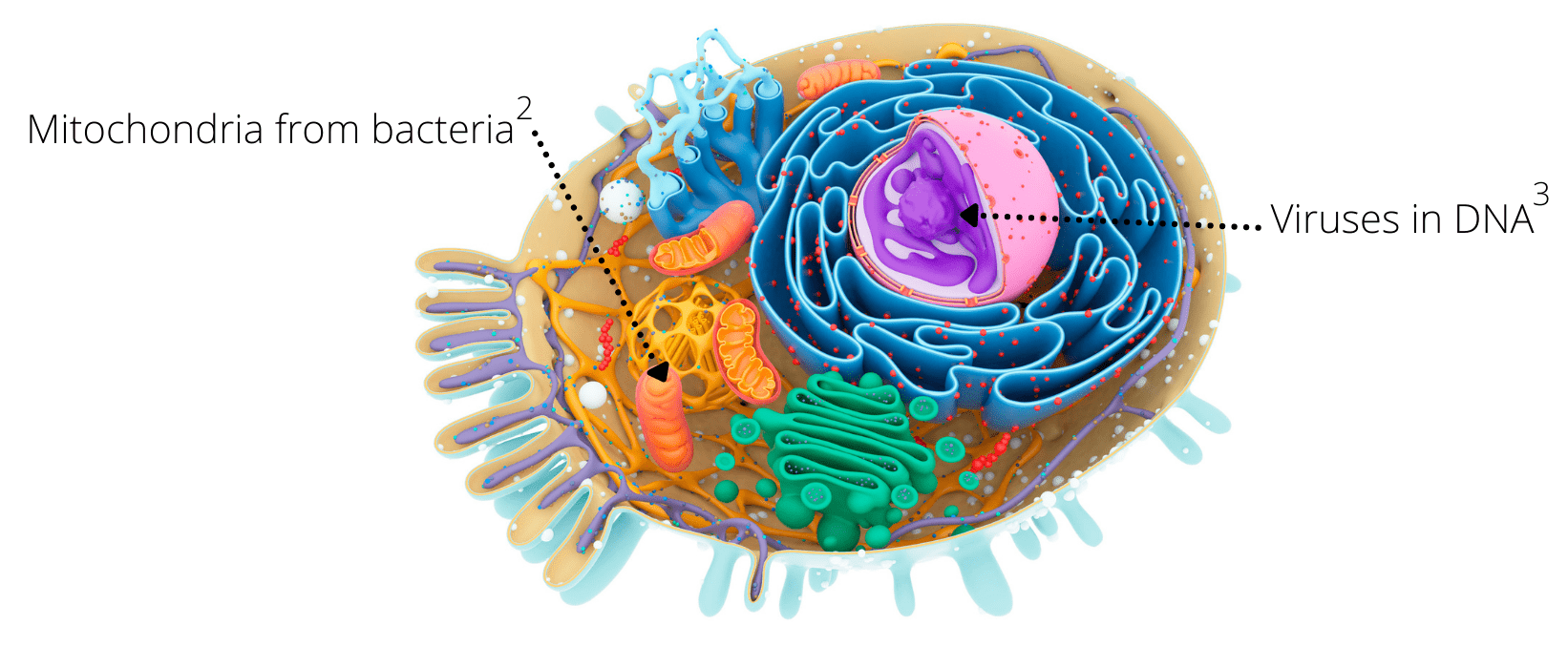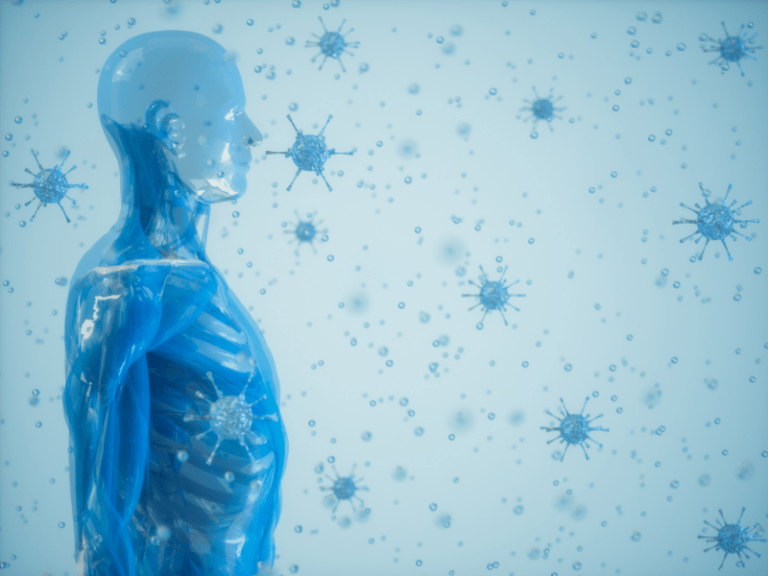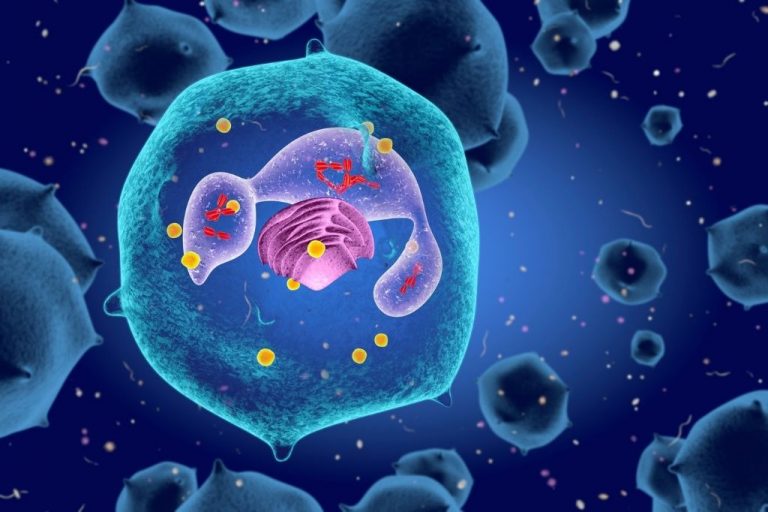Immunity – You Are Born With It

Humans are born with in-built defenses against bugs.
What could be more terrifying? A threat that cannot be seen, heard or sensed in anyway, but that can kill within days?
Had humans evolved in a sterile (bug-free environment), this might have been the case. However, humans would not be living today were it not for the microscopic organisms of the world. These creatures, originally termed “animalcules” when first seen under the microscope in 1676,1 make us who we are and keep us alive. Living in a bug-free environment is not healthy.

Graphic of a human cell showing the mitochondria which are thought to have originated from bacteria2 and the cell nucleus that contains our DNA, up to 10% of which originated from viruses.3 This ancient viral DNA actually helps our immune systems.4
Your Immune System

We are born with a functioning immune system. This is known as the innate immune system and it is designed to fight off any invading bug species.
During the first months of life our immune system is supported by factors in breast milk, allowing it to grow stronger as we come into contact with more and more micro-organisms in the environment. This is known as the acquired immune system, which provides defense against specific bugs. In adulthood we have robust innate and acquired immune systems, which then decline into old age.5
Take for instance Chicken Pox. When you first come in contact with the Chicken Pox virus (Varicella), you may suffer mild viral symptoms and blisters. These symptoms are due to the body activating the Innate immune system you were born with. Generally, the virus is subdued within a few days. During this time the acquired immune system goes into action, preparing for any further exposure to this virus. If you are exposed again, you will probably be blissfully unaware that your acquired immune system has jumped into action, getting rid of the virus.
Thus, in most people, the innate immune system is able to fend off attacks to “new” or “novel” microorganisms, with only mild to moderate symptoms, leaving the person stronger than before through stimulation of the acquired immune system.
In reality, the immune system is complex with intricate relationships and feedback mechanisms involving not only the immune cells but almost every other tissue, including the gut and the brain. Yes, your thoughts do affect your immune system.
That a healthy immune system knows to attack a disease-causing bacteria (such as E.coli), but does not attack a health-giving bacteria (such as Lactobacillus) or foreign objects such as food, is one of the miracles of nature.
Covid-19, The Common Cold and Immunity
Studies have shown that a significant proportion of the population have immunity to SARS-CoV-2, the virus that causes Covid-19, without having been infected or got sick with it.6,7 This is of course, due to the fact that SARS-CoV-2 is from the family of corona viruses which cause the common cold. When your body fights the common cold, it builds immunity to all coronaviruses. If you have had a common cold, you will have some immunity to SARS-CoV-2.8
Even more reassuring, numerous studies indicate that if you have contracted Covid-19 and recovered, you will have robust immunity and are unlikely to get Covid-19 a second time.9
What We Can Do
The evolution of humans and their immune system, with that of microorganisms, has resulted in the complex inter-relationship between us and millions of microorganisms. Generally, if we have enough “good” bugs, the “bad” ones can’t hurt us.
So, what keeps us from succumbing to infection by these “bad” bugs?
A Healthy Body
A healthy body (terrain) provides a home for the “good” bugs to live in and an effective way of fighting the “bad” bugs.
References
- Porter, J.R. Antony van Leeuwenhoek: tercentenary of his discovery of bacteria. Bacteriol Rev 40, 260-269 (1976).
- Gray, M.W. Mosaic nature of the mitochondrial proteome: Implications for the origin and evolution of mitochondria. Proceedings of the National Academy of Sciences of the United States of America 112, 10133-10138 (2015).
- Grandi, N. & Tramontano, E. Human Endogenous Retroviruses Are Ancient Acquired Elements Still Shaping Innate Immune Responses. Frontiers in Immunology 9(2018).
- Chuong, E.B., Elde, N.C. & Feschotte, C. Regulatory evolution of innate immunity through co-option of endogenous retroviruses. Science (New York, N.Y.) 351, 1083-1087 (2016).
- Simon, A.K., Hollander, G.A. & McMichael, A. Evolution of the immune system in humans from infancy to old age. Proceedings. Biological sciences 282, 20143085 (2015).
- Majdoubi, A., et al. A majority of uninfected adults show preexisting antibody reactivity against SARS-CoV-2. JCI Insight 6(2021).
- Ng, K.W., et al. Preexisting and de novo humoral immunity to SARS-CoV-2 in humans. Science 370, 1339-1343 (2020).
- Mateus, J., et al. Selective and cross-reactive SARS-CoV-2 T cell epitopes in unexposed humans. Science 370, 89-94 (2020).
- Turner, J.S., et al. SARS-CoV-2 infection induces long-lived bone marrow plasma cells in humans. Nature (2021).
- Gazit, S., et al. Comparing SARS-CoV-2 natural immunity to vaccine-induced immunity: reinfections versus breakthrough infections. medRxiv, 2021.2008.2024.21262415 (2021).
- Joshi, M.B., Thaddeus; Joshi, Anita. Vaccinating people who have had covid-19: why doesn’t natural immunity count in the US? British Medical Journal 374(2021).






3 Comments
Comments are closed.